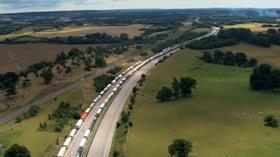
Kent County Council has been granted nearly £29m to upgrade infrastructure ahead of the UK’s looming exit from the EU on 29 March, the UK government has announced.
However, the Freight Transport Authority (FTA) has questioned whether the money for Operation Brock, the government’s transport management strategy in the event of a No-Deal Brexit, has been made available in time to have an impact in reinforcing the UK’s supply chain and preventing unnecessary delays to transport across Kent.
Heidi Skinner, the FTA’s policy manager for the South-East, commented: “The funding commitment for the transport sector is welcome news for a logistics sector charged with keeping Britain trading after Brexit. The logistics industry knows that a No-Deal departure from the EU will present significant challenges for the sector, and this investment for the transport network will provide welcome protection for the vital link for the UK’s trading relationships – 17 per cent of the UK’s trade goes through Dover.”
Whatever the outcome of negotiations, Skinner said, freight would need to adapt. “But the transport infrastructure must be robust enough to meet the demands of the supply chain,” she said. “The logistics industry is already being forced to waste millions of pounds trying to prepare for an uncertain future, which the industry was promised would not happen. Due to the lack of progress towards a Brexit deal, the logistics industry has been left waiting for an agreement to frictionless trade.”
Skinner highlighted the amount of work still to be done in the weeks remaining. “UK and overseas drivers need to understand what restrictions they will face, but there has been no communication yet,” she said. “Freight and logistics firms need information and time to prepare – neither have been given. The logistics industry always does its best to Keep Britain Trading – it is flexible and able to adapt (given notice) but is not, and cannot be, prepared in such a short time to make good the chaos of a No-Deal Brexit.”
Simon Wilkinson of Kent-based Harrier Express, whose fleet of 18 refrigerated lorries crosses the Channel each day, told the Guardian that he had been trialling a new route from Zeebrugge to Purfleet. This route would require using “unaccompanied” lorries, necessitating two drivers, a 20 per cent drop in freight capacity and the setting up of a separate company in Belgium, Wilkinson revealed.
Up to 10,000 trucks cross the Channel every day, with virtually all checks conducted on the French side due to limited space at Dover. French authorities have warned a two-minute delay at the border could lead to 27,000 vehicles queuing up on each side of the Channel.






No comments yet